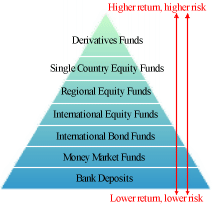FUND INVESTMENT Q&A
What is a unit trust?
Unit trusts (and mutual funds as they are sometimes known) are professionally managed investment schemes that pool the money of like-minded investors together to invest into equities, bonds, and currencies. Many individual investors in Hong Kong find unit trusts to be a cost effective and simple way to access global equity and bond markets. For instance, with as little as US$1,000, you can invest in a global equity unit trust that invest in a basket of over 50 stocks, providing you access to the best investments around the world and maximum diversification.
Why should I invest in unit trusts?
Unit trusts offer individual investors a simple and effective way to invest and build wealth over time. Key benefits include:
-
Professional Management
Unit trusts are managed by professional fund managers whose mandate is to identify the best investment opportunities, invest in them, and manage risk according to the unit trust's investment objective.
Fund managers have an average of 3 to 5 years' experience in investment management. Through an international network, they have access to first hand macro and micro information which helps them make informed investment decisions.
-
Access to investment opportunities worldwide
Due to high transaction cost, lack of time, information, and market access, individual investors may find it difficult to benefit from investment opportunities outside of Hong Kong. With one simple investment of as little as US$1,000, an investor can access these overseas investment opportunities through unit trusts.
-
Risk diversification
As each unit trust invests in an average of over 50 securities, it offer investor maximum diversification, that is, the gain of one investment can be used to offset any loss in another due to unforeseen economic, political, and investment factors.
-
High liquidity and simple maintenance
Like stocks, unit trusts are traded and can be bought and sold daily, providing easy access to your money.
Many fund managers offer daily price quotation on newspapers and through their distributors, making it very easy to track your investments.
How do fund managers invest?
Investment Approach
-
Top Down
An investment approach that starts with global markets' macro economic research, then followed by stock selection.
A macro-economic analysis includes understanding and projection of interest rate, economic growth, inflation, and currency trends.
Stock selection is driven by company visits and quantitative research to understand the company's business strategy, financial situation, and growth prospects.
Stock weightings are heavily guided by country weightings of the trust's relevant benchmark index.
-
Bottom Up
An investment approach that focuses on stock selection, supplemented by macro-economic factors.
Stock weightings are heavily guided by where the best stocks are found, with less emphasis on relevant benchmark country weightings.
Investment Transaction
Individual fund management companies have strict internal guidelines to ensure investment orders are placed within the guidelines of the unit trust's objectives.
|
|
Investment transactions |
|
|
Fund Manager |
Advises trustee of trade

|
Trustee
(Takes custody of stocks, cash & other fund assets) |
|
Places trade order

|
|
 |
|
Broker |
 |
Checks that the trade complies with the "trust deed", matches trade and settles |
What types of unit trust will suit me?
Currently, there are over 1,600 unit trusts that are authorized for sale in Hong Kong by the Securities and Futures Commission. This includes a broad spectrum of unit trusts that have different risk return objectives.
In general, these are the types of unit trusts and their relevant risk. The higher the return potential, normally the higher the risks involved. Investors are advised to consult with your professional investment adviser to decide which unit trusts best suit your personal circumstances.

What kind of protection will I get as an investor?
When you invest in a unit trust, your investments are held within a trust structure, separated from the fund manager's assets. The trusts' dealings are supervised by an independent trustee and the general supervision of the Hong Kong Securities and Futures Commission, thus offering you asset safety and peace of mind.
What should I consider when buying unit trusts?
When making a decision on what unit trust to buy, you can consider the following:
-
Your personal situation
-
Your investment goal
-
Your investment horizon
-
Your risk tolerance
-
The fund manager
Its reputation
-
Total funds under management
-
Investment process and infrastructure
-
After sales service
The fund
-
Historical track record - consistency and absolute results
-
Fund manager's expertise and experience with this fund
-
Whether it suits your personal situation
Where can I buy unit trusts?
You can buy unit trusts from:
-
Fund manager - many fund managers offer sale of their unit trust products directly from their own team of advisers, by phone, or by mail.
-
Retail banks - offering one stop shopping convenience for bank clients
-
Private banks - offering more in depth research and service for high net worth individuals
-
Independent financial advisers - offering full financial advice, usually with a wide product mix, to investors
How can I buy and sell unit trusts?
Most unit trusts in Hong Kong are traded on a daily basis. Investors can buy and sell by placing their instructions with their adviser from the above channels.
-
Buy
-
Investor places an order to buy a particular amount of a unit trust.
-
The buy order is normally executed on the same day and invested into the relative unit trust immediately based on the day's closing price of the unit trust.
-
Fund manager issues a contract note detailing the number of units bought, purchase price, and total purchase amount.
-
Sell
-
Investor places a sell order to redeem part or all of his holdings in a unit trust.
-
Fund manager sells that relevant number of units at the closing price of that day.
-
Redemption proceeds are normally sent within one week from order date.
-
Fund manager issues a contract note detailing the number of units sold, redemption price, and total settlement amount.
How do I make money from my unit trust investments?
An investor can make money from unit trusts:
-
Capital gains
-
appreciation in value of the underlying stock or bond investments
-
Dividend income
-
fund managers may, depending on the objective of the unit trust, distribute income earned by the underlying investments
-
common with bond and income funds that pay regular dividends
How much do I have to pay?
A unit trust typically has the following charges:
-
Front end fee
-
Redemption fee
-
Management fee
How are unit trust prices calculated?
Normally, a unit trust would either quote in NAV or bid/offer:
|
1) |
Net asset value |
= |
total value of underlying investments less all expenses including management fee |
|
2) |
Offer price
(price at which you buy) |
= |
(Net asset value/no. of units) |
+ |
front end fee |
|
|
Bid price
(price at which you sell) |
= |
(Net asset value/no. of units) |
- |
redemption fee, if applicable |














